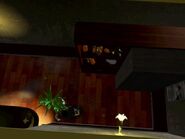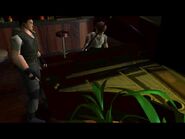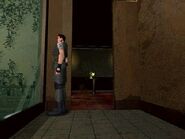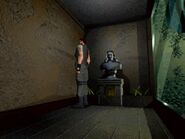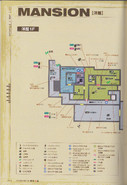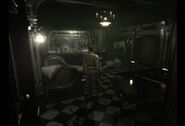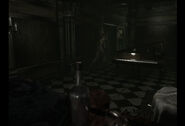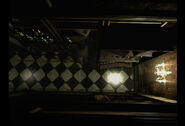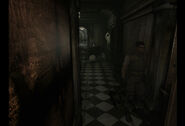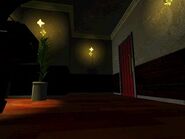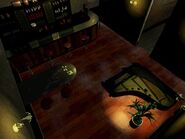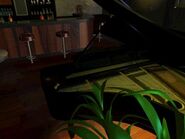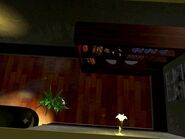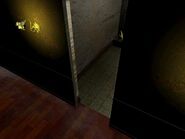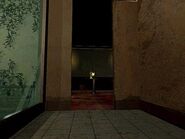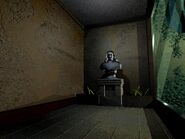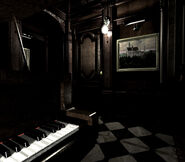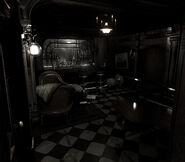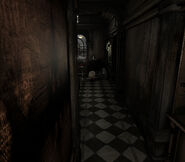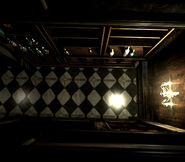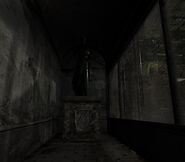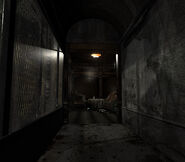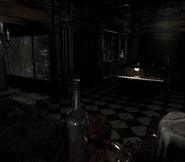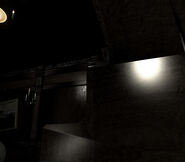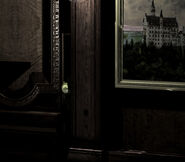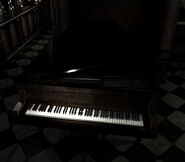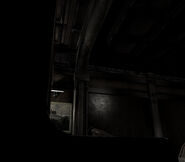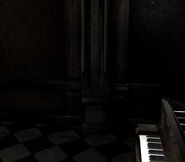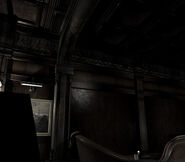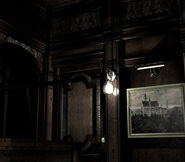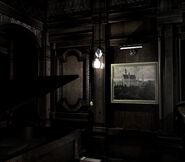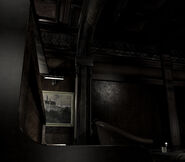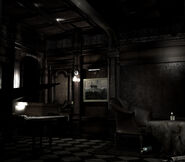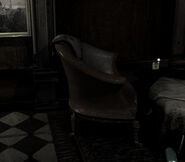(→Description: Fixed grammatical issues) |
m (Forerunner moved page Spencer Mansion/Bar (Spencer Mansion) to Spencer Mansion/Bar) |
||
| (3 intermediate revisions by 2 users not shown) | |||
| Line 31: | Line 31: | ||
In the 2002 [[Resident Evil (2002 game)|''Remake'']], the floor was made black and white tiles instead of wood. There is a counter made of oak, with it some seats. A grand piano and a picture of the Mansion are also placed inside the bar. |
In the 2002 [[Resident Evil (2002 game)|''Remake'']], the floor was made black and white tiles instead of wood. There is a counter made of oak, with it some seats. A grand piano and a picture of the Mansion are also placed inside the bar. |
||
| − | Though in both the original and remake version, the secret entry leads to a small hidden passage. The passage was composed of a large glass mirror where the [[Greenhouse]] can be viewed |
+ | Though in both the original and remake version, the secret entry leads to a small hidden passage. The passage was composed of a large glass mirror where the [[Greenhouse]] can be viewed. There was also a statue with a gold emblem embedded on it. |
==Guide== |
==Guide== |
||
| Line 102: | Line 102: | ||
;2002 |
;2002 |
||
<gallery> |
<gallery> |
||
| + | Biohazard_kaitaishinsho_-_page_358.png|Item location map in ''biohazard Kaitai Shinsho'' |
||
Piano Room (3).jpg |
Piano Room (3).jpg |
||
Piano Room (4).jpg |
Piano Room (4).jpg |
||
Revision as of 17:35, 18 April 2019
The Bar[1] is an area of the Spencer Mansion, located on the west-wing's ground floor.
Description
It is a bar brighten by the stylish shape lamps placed on the wall. Most of the floor is wooden made. There is a counter with few seats, behind is the collection of alcohol drinks that are stored on the shelf. A grand piano is placed at the middle of the room, with a plant behind.
In the 2002 Remake, the floor was made black and white tiles instead of wood. There is a counter made of oak, with it some seats. A grand piano and a picture of the Mansion are also placed inside the bar.
Though in both the original and remake version, the secret entry leads to a small hidden passage. The passage was composed of a large glass mirror where the Greenhouse can be viewed. There was also a statue with a gold emblem embedded on it.
Guide
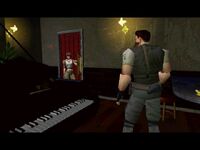
Rebecca enter this room.
In the original Resident Evil and its 2002 Remake, player can find a Music Notes on the shelf. Then, they can use it on the piano:
- Chris - Unfortunately, Chris cannot read music the notes and unable to play the piano properly. Later, Rebecca will enter this room and play the "Moonlight Sonata". She will need time to be able to play that music notes properly. While she practicing, player can leave the room and explore the mansion. Whenever player return to this room, she will be able to play the piano perfectly.
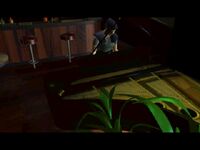
Jill playing the piano.
- Jill - Jill can play the Moonlight Sonata perfectly with the piano.
After player played the music notes, a secret room will open where inside contain a Gold Emblem. It can be switch with the Emblem in the Dining hall.
Examines
| Resident Evil | |||
| Location | Localization | Original Script | |
|---|---|---|---|
| Check the piano | A fine grand piano. | ||
| Using the Music Notes on the Piano (Chris) | Chris unfortunately can't read music. | ||
| Using the Music Notes on the Piano (Jill) | It's "Moonlight Sonata". | ||
| After Rebecca play the piano for the first time | Will you have Rebecca practice? Yes/No | ||
| The hollow inside the secret room. | It's the hollow that an emblem was it. | ||
| Checking on Rebecca while she's practicing | Rebecca is playing the piano. | ||
| Resident Evil | |||
| The mansion picture | There's something written in the corner of the picture:
"Commemorating the completion of the mansion..." |
||
| The piano | An expensive-looking grand piano. | ||
| The counter desk | A wooden counter made of oak. It gives off a pleasant aroma, like fine wine. | ||
Gallery
- 1996
- 2002
Backgrounds
- 1996
- 2002
Further notes
- The mansion painting that appears in the remake is of Neuschwanstein Castle, which appears elsewhere in the original and remake versions.
Bibliography
- Takeo, Sakamoto, ed (1997) (in Japanese). Inside of BIO-HAZARD. Famitsu. ISBN 4-89366-659-2.
- Hamamura, Koichi, ed (2002) (in Japanese). biohazard Kaitai Shinsho. Famitsu. ISBN 4-7577-0980-3.
Sources
- ↑ Hamamura (ed.), kaitaishinsho, p.106.

